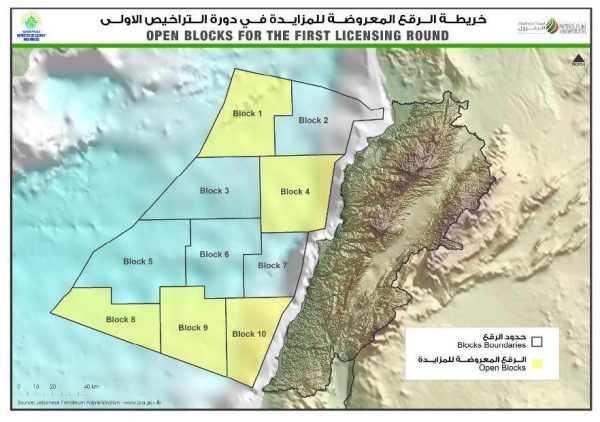
Signs of a new border crisis have emerged between Lebanon and Syria, after the Syrian government signed with a Russian company a contract for oil exploration in the Mediterranean.
The block to be explored intersects with Lebanese maritime areas for energy exploration along the northern border.
Lebanon set the map of the maritime blocks for oil and gas exploration in its economic waters several years ago. The map highlighted a border dispute with Israel in the South, before Damascus completed its own plan for energy exploration in the Mediterranean, showing an intersection with the Lebanese map.
Earlier this month, Syria signed a contract under which it granted a Russian company the exclusive right to explore oil “in the offshore Block No. 1 in the Syrian exclusive economic zone in the Mediterranean Sea, off the coast of Tartous Governorate, up to the Syrian-Lebanese maritime borders, over an area of 2,250 square kilometers.”
The Lebanese authorities did not react to the signing of the contract although the block set for exploration overlaps with the Lebanese areas No.1 and 2 and results in a clear border dispute.
Lebanese diplomatic sources told Asharq Al-Awsat that the issue has never been raised in the Ministry of Foreign Affairs nor a decision has been taken to address Syria on the matter.
Lebanese researcher and oil expert Laury Haytayan told Asharq Al-Awsat that the disputed area ranged between 750 and 1,000 square kilometers, saying the Lebanese authorities have not taken any action since the Syrian announcement of the signing of the agreement with Moscow.
The maritime border area with Syria has been a point of contention since 2011. Lebanon unilaterally designated border point No.6 in an official document submitted to the United Nations in 2010, re-corrected it in 2011 by fixing point No.7 and subsequently reported it to the UN.
Damascus objected to the unilateral Lebanese demarcation of its exclusive economic zone in the north, by sending a protest letter to the United Nations in 2014.
Haytayan noted that the recent development “calls for a position on the part of the Lebanese government, by either addressing the Syrian authorities about drilling in a disputed area… or about reaching an agreement over the border demarcation.”

Leave a Reply
You must be logged in to post a comment.